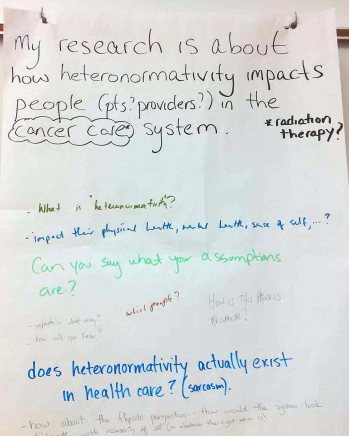
Our last summer course was intended to get us to take the first steps towards our research question. We looked at conceptual frameworks and methods, literature reviewing and tried to find a “home” – or a way of thinking about research that felt right to us. We all vaguely knew what our fellow-cohort members were thinking about investigating but we workshopped, we brainstormed with flip charts, we picked holes and (sometimes) we patted backs. A few people have thrown out the research thoughts they started with and found new ones, job roles have changed, interests have shifted and the cold light of day is starting to show some of the cracks in our idealistic initial ideas.
One of the reasons I wanted to do this degree was the luxury to be able to focus on a substantial piece of research. I had always wanted to re-examine my experience as a queer health care professional (HCP) – partly for me, as I get older I find I want to look at things from another angle, perhaps to see what I missed the first time. The other reason is that quite a bit of attention has been paid to making the experiences of LGB patients better – but almost all research that looks at HCPs is from a deficit perspective – focusing on negative experiences such as bullying or homophobia in the workplace. I think it is a lot more nuanced than that – I know that LGB staff can help LGB patients feel more “at home” – but I also think that the delicate and daily dance of coming out still looms large in many HCPs’ lives and that we can do a better job at understanding, and supporting, us/them.
So after a brief dalliance with patient experiences (see last blog!), and a pretty hot and heavy flirtation with Dorothy Smith this summer (of Institutional Ethnography fame), I am back to the beginning. Last year I was thinking of using interviews, and phenomenology – but the further I travel, the more I want to bring my own experience into the mix. Isn’t that why I got into this? In one of my assignments I talked about this process being like a “late life coming out” and after having stood up a few times and “exposed myself” as a lesbian behind a podium talking about my recent paper…..in front of my actual work colleagues, peers and friends…..that is exactly what it feels like. I wrote in February about finding my research voice – it’s clear that my voice is critical, and very personal. I mean critical in the way described by Kinchloe and McLaren (2005, p. 304) in that research can never be entirely neutral or value free, and that “mainstream research practices are generally, although most often unwittingly, implicated in the reproduction of class, race and gender oppression.”
This fall I am looking at narrative inquiry (my last elective) – and reading a lot! In health care storytelling pops up in narrative medicine (described in this Ted talk by Rita Charon) and in illness narratives like those of Arthur Frank in “The Wounded Storyteller” where he explores the very human need to make sense and meaning from illness (interestingly, he says that he wrote it partly as an exercise in “self-healing . . . to assure myself I wasn’t crazy”). As a lifelong lover of reading, I think I may have found the perfect fit for my research approach!

Like your thinking 😊
LikeLiked by 1 person